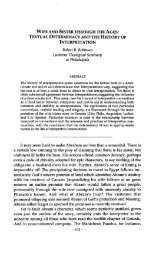FROM EXEGESIS TO HERMENEUTICS - Rice School of Pastoral ...
FROM EXEGESIS TO HERMENEUTICS - Rice School of Pastoral ...
FROM EXEGESIS TO HERMENEUTICS - Rice School of Pastoral ...
You also want an ePaper? Increase the reach of your titles
YUMPU automatically turns print PDFs into web optimized ePapers that Google loves.
Schneiders: From Exegesis to Hermeneutics 27Nor did the exegete have to deal with the theological and pastoralimplications <strong>of</strong> what he or she uncovered. The exegete's task was touncover and deliver what the sacred author meant to say. It was theproblem <strong>of</strong> the theologian to figure out what that might mean today and<strong>of</strong> the pastor to apply it to the life <strong>of</strong> the Church.However, this relatively airtight division <strong>of</strong> labor within which thebiblical exegete engaged in a purely scientific investigation <strong>of</strong> historicaldata innocent <strong>of</strong> responsibility for its theological or pastoral implications, broke down during the second phase. There were several factors inthe breakdown, but I will mention only two, one extra-ecclesial and oneintra-ecclesial. First, let us look at the outside influence. Since WorldWar Π, religious studies departments have been springing up on universitycampuses all over the country while divinity schools and theologateshave increasingly sought the university milieu rather than theisolated seminary as the proper context for the preparation <strong>of</strong> theologiansand ministers. 17 Consequently, biblical studies has found itself inthe midst <strong>of</strong> the multi-disciplinary and increasingly inter-disciplinaryatmosphere <strong>of</strong> the modern world <strong>of</strong> higher education. No longer isbiblical study defined exclusively by the historical disciplines. Sociology,psychology, literature, philosophy, and aesthetics are also raisingquestions in regard to the interpretation <strong>of</strong> biblical texts. 18 As a widevariety <strong>of</strong> nonhistorical humanistic disciplines has been applied toscriptural materials the focus <strong>of</strong> interest has shifted from an exclusiveconcern with what the text meant in the past to a concern with what thetext has meant in the course <strong>of</strong> its transmission and especially to what itmeans today. Once the Catholic biblical scholar begins to see the contemporarymeaning <strong>of</strong> the text, rather than its original meaning, as theultimate object <strong>of</strong> biblical interpretation he or she is no longer immunefrom the theological or pastoral consequences <strong>of</strong> his or her work.The effect <strong>of</strong> this extra-ecclesial influence toward concern with thecontemporary meaning <strong>of</strong> the text has been reinforced by the changingter (New York: Sheed and Ward, 1965); A. Dulles, Revelation Theology: A History (NewYork: Seabury, 1969); Theology, Exegesis, and Proclamation, ed. R. E. Murphy. Concilium,vol. 70 (New York: Herder and Herder, 1971); E. Schillebeeckx, Revelation andTheology, tr. N. D. Smith, 2 vols. (New York: Sheed and Ward, 1967-1968).17For an interesting summary <strong>of</strong> the present situation <strong>of</strong> biblical studies in the U.S.A.and a comparison and contrast <strong>of</strong> the university vs. seminary context, see P. J. Achtemeierand G. M. Tucker, "Biblical Studies: The State <strong>of</strong> the Discipline," and W. Brueggemannand D. A. Knight, "Why Study the Bible?", Bulletin <strong>of</strong> the Councu on the Study <strong>of</strong> Religion11 (June 1980), 72-76 and 76-81 respectively. See also P. Henry, New Directions in NewTestament Study (Philadelphia: Westminster, 1979), esp. pp. 17-20 and 264-66, and "ThePlate Tectonics <strong>of</strong> New Testament Study," Theology Today 37 (April 1980), 51-58.18It is extremely interesting to note the five headings under which the Society forBiblical Literature organized its Centennial Program in Dallas, TX, November 5-9,1980:Approaches to the Bible through Language Analysis; Approaches to the Bible throughSocial Analysis; Approaches to the Bible through the Question <strong>of</strong> Meaning (hermeneutics);Approaches to the Bible through History and Archaeology; The History and Sociology <strong>of</strong>Biblical Scholarship.



